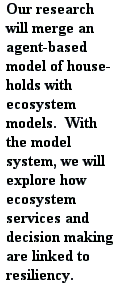 |
||

|
Our research has three main objectives. First, we wish to understand the attributes which affect household
resilience/vulnerability to social or biophysical perturbations. We are interested in the scale of social
organization where decisions are made and the effects on resilience. We are also interested in the
thresholds of systems that result in the movement of systems to a new set of livelihood strategies and
under what conditions the new strategies allow for learning and feedback. We are interested in the
evolution of households over time. A number of questions arise. Do a large number of factors (see
conceptual framework below) lead to resilience in human-ecological systems, leaving them less
susceptible to social and resource crisis? Institutions at the local level which are the source of
decision making may work for some societies but not others. When decisions are not made at the
household level, is resilience conferred on some higher level of social organization leaving resilience
low at the household? Do informal rules make people more able to deal with change? Are formal
institutions constraints to dealing with change?
Second, we wish to understand the linkages between resources/ecosystem services and household land use decision making. Questions include, how and to what extent do ecosystem services (provisioning and supporting) influence household decision making? How and to what extent does household resilience/vulnerability affect ecosystem services? Does household resilience/vulnerability imply ecological resilience/sustainability? How closely coupled are the ecological and social systems? What are the ?learning? and ?feedback? mechanisms between the social and ecological systems? Do people tend to be focused on provisioning services (and thus focused on the short-term) and not supporting services (which takes a long-term perspective)? Are small-scale societies more clued into provisioning services than are those who move into global economies?
The third objective is to develop an integrated suite of models that includes an agent-based model
that can link to ecosystem models. This objective is discussed in detail in the section Modeling
Decision Making and Ecosystem Services. In order to address these objectives we need to have first,
a conceptual framework from which to understand the household processes, and second, sites where
we ask these questions.
| |